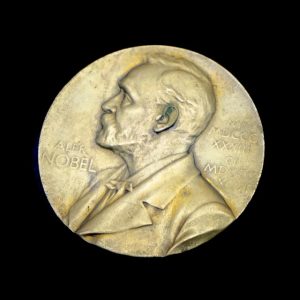驚きのノーベル賞受賞者! 今年は日本から2人も ――浮かび上がる「基礎科学支援」の課題
 ノーベル
ノーベル
驚きのノーベル賞受賞者! 今年は日本から2人も
――浮かび上がる「基礎科学支援」の課題
■ 幼い頃の憧れ ― 湯川秀樹博士の時代から
私が子どもの頃、ノーベル賞といえば真っ先に思い浮かぶのは、
1949年に物理学賞を受賞した湯川秀樹博士でした。
当時は教科書にもその名前が載っており、両親からも
「将来は湯川さんのような素晴らしい研究者になってほしい」と
言われたことを覚えています。
もっとも、それは“夢の中の夢”でしたが――。
■ 日本人2人の快挙! 世界をリードする研究力
そして今年、なんと日本人研究者2名がノーベル賞を受賞しました。
(※この記事執筆時点:10月10日現在)
これで日本の受賞者は個人30人と1団体。
世界に貢献する研究成果を次々と生み出しており、
日本人として大きな誇りを感じます。
🧬 生理学・医学賞:大阪大学 坂口志文 特任教授
坂口教授が発見した**「制御性T細胞」**は、
免疫反応の暴走を抑える“ブレーキ役”を果たす重要な細胞です。
この働きが弱まると、免疫が正常な細胞まで攻撃してしまい、
自己免疫疾患などの原因となります。
坂口教授の研究は、がんや難病治療にもつながる可能性があり、
世界中で大きな注目を集めています。
⚗️ 化学賞:京都大学 北川進 教授
北川教授は、次世代の「多孔性素材」を発見。
この素材は気体の貯蔵や分離に優れ、
脱炭素・エネルギー問題の解決に大きく貢献すると期待されています。
環境と科学の両面から持続可能な未来を支える研究として高く評価されています。
■ 「基礎科学への支援不足」――坂口教授の訴え
一方で坂口教授は、受賞後のインタビューでこう語りました。
「日本は基礎科学への支援が十分ではない。
世界では治療応用研究が進む一方、国内では活発さを欠いている。」
この言葉は、長年指摘されてきた日本の研究支援体制の課題を、
改めて突きつけたものです。
■ 日本の研究予算は本当に足りているのか?
総務省の「科学技術研究調査」によると、
2023年度の日本の科学技術研究費は22兆497億円(前年比+6.5%)。
GDP比でも3.70%と過去最高を記録しています。
しかし、国際比較では見方が変わります。
「科学技術指標2023」によると、研究開発費は以下の通りです。
- 米国:87兆6,485億円
- 中国(2021年):66兆663億円
- ドイツ:16兆6,002億円
- 韓国:13兆1,956億円
- 日本:20兆7,040億円(第3位)
見た目には高水準ですが、米中の研究規模との差は歴然です。
特に米国は日本の約4倍、中国は約3倍という驚異的な伸びを示しています。
 イメージ
イメージ
■ ノーベル賞学者・山中伸弥教授の挑戦 ― クラファンで研究をつなぐ
こうした状況の中、ノーベル賞受賞者・山中伸弥教授(京都大学iPS細胞研究所)は、
クラウドファンディングを通じて研究資金の確保に取り組んでいます。
その理由は明確です。
国の助成金は「期限付き・成果主義」が中心で、
長期的な基礎研究や設備維持に使える資金が少ないためです。
山中教授はこう語っています。
「研究費の総額は増えているが、成果を求められる競争的資金が多く、
安定的な運営に使えるお金が減っている。」
クラファンの目的は、
- 国・公的資金で賄えない研究費を補う
- 基礎・再生医療研究を推進する
- 市民が科学に参加する仕組みをつくる
- 寄付文化を根付かせる
といった点にあります。
結果として、山中教授の取り組みは10億円以上の寄付を集め、
新しい研究支援モデルを社会に提示しました。
 イメージ
イメージ
■ 「日本人ファースト」を科学分野にも
私自身の印象として、日本の研究者への予算や支援はまだ十分とは言えません。
政治の世界では「基礎研究は票にならない」と敬遠されがちですが、
国の将来を考えるならば、科学こそ日本の潜在力(ポテンシャル)を引き出す原動力です。
いまこそ「日本人ファースト」の精神を、基礎科学支援にも生かすべきではないでしょうか。
次回は、ノーベル賞の特許を少し掘り下げてみたいと思います。
(続く)
 NOBEL
NOBEL
“Two Japanese Winners in One Year!”
A Historic Nobel Achievement and
the Challenge of Supporting Basic Science
■ A Childhood Aspiration — From the Era of Dr. Hideki Yukawa
When I was a child, the name that came to mind whenever
I heard “Nobel Prize” was Dr. Hideki Yukawa,
who received the Nobel Prize in Physics in 1949.
His name appeared even in our school textbooks,
and I remember my parents telling me,
“I hope you’ll become a great researcher likeDr. Yukawa someday.”
Of course, that was merely a “dream within a dream” —
but still an inspiration.
■ Two Japanese Laureates! —
Japan’s World-Leading Research Power
This year, remarkably, two Japanese scientists have received Nobel Prizes.
(As of October 10, at the time of writing.)
With this, Japan now has 30 individual laureates and
one organization recognized by the Nobel Committee.
Their groundbreaking work continues to contribute to humanity,
filling us with national pride.
🧬 Physiology or Medicine Prize:
Prof. Shimon Sakaguchi, Osaka University
Professor Sakaguchi discovered “regulatory T cells,”
which play a crucial role as the “brakes” of the immune system,
preventing excessive immune reactions.
When their function weakens,
the immune system begins to attack normal cells —
leading to autoimmune diseases.
His pioneering research holds immense potential for
advancing treatments for cancer and other intractable diseases,
and has attracted global attention.
⚗️ Chemistry Prize:
Prof. Susumu Kitagawa, Kyoto University
Professor Kitagawa discovered a new generation of porous materials,
which excel in gas storage and separation.
These materials are expected to make major contributions
to decarbonization and energy sustainability.
His work is highly regarded as research that
supports a sustainable future for both the environment and science.
■ “Lack of Support for Basic Science” —
Prof. Sakaguchi’s Candid Message
Following his award, Professor Sakaguchi stated in an interview:
“Japan does not provide sufficient support for basic science.
While applied medical research is progressing worldwide,
domestic efforts remain sluggish.”
His words once again highlight a long-standing issue —
Japan’s inadequate system of research funding and
institutional support.
■ Is Japan’s Research Budget Really Enough?
According to the Ministry of Internal Affairs and Communications’
Survey on Science and Technology Research,
Japan’s total research expenditure in FY2023 was
22.05 trillion yen (a 6.5% increase year-on-year),
reaching a record 3.70% of GDP.
However, international comparisons paint a different picture.
According to Science and Technology Indicators
2023, R&D spending was:
- United States: 87.65 trillion yen
- China (2021): 66.06 trillion yen
- Germany: 16.60 trillion yen
- South Korea: 13.20 trillion yen
- Japan: 20.70 trillion yen (3rd place)Although Japan appears to invest heavily,
the gap with the U.S. and China is overwhelming —
America spends about four times, and China three times as much as
Japan on research and development.
 image
image
■ Nobel Laureate Shinya Yamanaka’s Effort —
Sustaining Research through Crowdfunding
Amid this environment, Nobel laureate Professor Shinya Yamanaka
of Kyoto University’s iPS Cell Research Institute
has turned to crowdfunding to secure research funds.
The reason is clear:
Government grants in Japan are often time-limited and results-oriented,
leaving little flexibility for long-term basic research or maintenance costs.
As Professor Yamanaka explains:
“While total research funding has increased,
much of it is competitive and tied to specific outcomes.
The amount of stable funding for day-to-day operations has decreased.”
The goals of his crowdfunding initiative include:
- Supplementing research funds that government grants cannot cover
- Promoting basic and regenerative medicine research
- Creating a system where citizens can participate in science
- Fostering a culture of donation and scientific support
As a result, his initiative has raised over 1 billion yen,
presenting a new model of research funding for society.
 image
image
■ Bringing “Japan First” Spirit to Science
In my view, Japan still does not provide adequate support or
funding for its researchers.
In politics, “basic research” is often overlooked because it “doesn’t win votes,”
but for the nation’s future,
science is the true driving force that unlocks Japan’s potential.
Now is the time to apply the spirit of
“Japan First” to the support of basic scientific research.
In the next article, I plan to take a closer look at
the patents behind Nobel Prize-winning discoveries.
(To be continued.)

